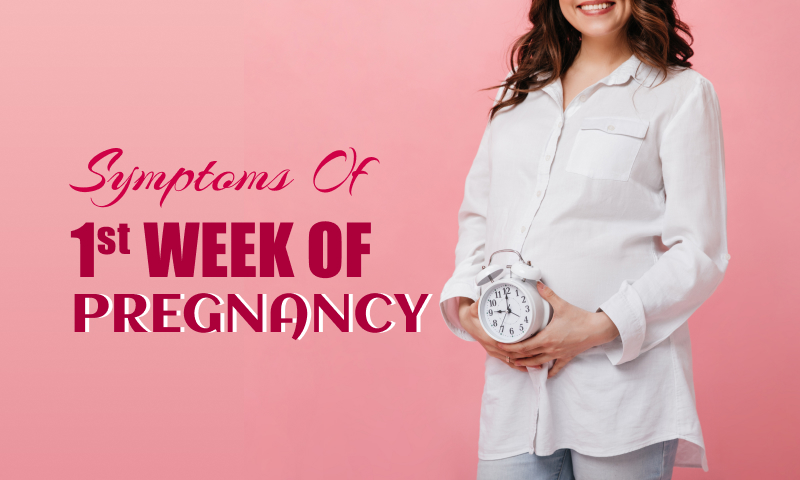Pregnancy is a remarkable and complex journey that begins with the fertilization of an egg by a sperm. The initial stages of pregnancy are often accompanied by subtle yet significant changes in a woman’s body, some of which may manifest as symptoms as early as the first week. While it is important to note that the first week of pregnancy is calculated from the first day of the last menstrual period, conception and implantation occur later. This period is critical, as it marks the beginning of the miraculous process of embryonic development. In this comprehensive exploration, we will delve into the symptoms of the First week of pregnancy, shedding light on the physiological changes and emotional nuances accompanying this extraordinary phase.
Introduction
The first week of pregnancy is a meaningful and intricate phase in a woman’s life, marked by the silent inception of a profound journey. While conception occurs towards the end of this week, the earliest signs of pregnancy may manifest sooner than expected. Implantation, the crucial event where the fertilized egg embeds itself into the uterine lining, often brings about subtle but significant changes. Implantation bleeding, a delicate occurrence, may be mistaken for a light menstrual period. Mild cramping accompanies this process, signifying the uterus adapting to the budding life within. Changes in cervical mucus, breast sensitivity, and the onset of fatigue are among the initial physiological transformations driven by the surge in hormonal activity. Nausea, morning sickness, frequent urination, and mood swings may also enter, unveiling the intricate dance of the body’s adaptation to a developing embryo. The emotional landscape during this period is dynamic, as women grapple with the anticipation, excitement, and uncertainty that accompany the realization of the potential for new life. In this exploration, we unravel the nuanced symptoms of the first week of pregnancy, delving into the remarkable interplay of biology and emotion that defines this extraordinary chapter in a woman’s life.
Understanding the First Week
The first week of pregnancy is paradoxical as conception occurs towards this week’s end. During this period, a woman may not be aware of the life-altering changes happening within her body. The journey begins with ovulation, where a mature egg is released from the ovary and awaits fertilization. The sperm must navigate the intricate path to meet the egg. Once fertilization occurs, the zygote travels down the fallopian tube toward the uterus. By the end of the first week, the fertilized egg undergoes several divisions, forming a blastocyst, ready for implantation.

Physiological Symptoms of the 1st week of pregnancy
During the first week of pregnancy, several physiological changes and symptoms emerge, heralding the onset of a transformative journey. Implantation bleeding, a common occurrence, results from the blastocyst embedding itself into the uterine lining. Mild cramping accompanies this process as the uterus adjusts to the growing embryo. Changes in cervical mucus, becoming thicker and stickier, reflect hormonal shifts supporting implantation. Breast sensitivity arises from increased progesterone levels, contributing to tenderness and soreness. Hormonal fluctuations, a surge in estrogen and progesterone, induce fatigue and mood swings. Nausea and morning sickness, though more commonly associated with later stages, can manifest. Frequent urination results from increased blood flow and hormonal changes. Together, these symptoms make up the intricate dance of physiological adjustments, marking the inception of the incredible pregnancy journey.
Implantation Bleeding
Implantation bleeding is one of the first indications of pregnancy. As the blastocyst burrows into the uterine lining, it may cause slight bleeding or spotting. This occurrence is often mistaken for a light menstrual period, and many women may not recognize it as a sign of pregnancy.
Mild Cramping
Some women experience mild cramping during the first week of pregnancy. This can be attributed to the implantation process and the uterus adapting to the growing embryo.
Changes in Cervical Mucus
The consistency and appearance of cervical mucus can change in early pregnancy. Some women may notice increased cervical mucus, which becomes thicker and stickier. This change is influenced by hormonal shifts that support the implantation process.
Breast Sensitivity
Hormonal changes, an increase in progesterone, can lead to breast sensitivity. Women may notice that their breasts feel tender or sore. This is a common early symptom that can persist throughout the first trimester.
Fatigue
The body undergoes significant changes during the early stages of pregnancy, including increased progesterone levels. This hormone has a soothing effect, leading to feelings of fatigue and exhaustion. Women might require more rest than normal.
Nausea and Morning Sickness
While morning sickness is often associated with later stages of pregnancy, some women may experience mild nausea during the first week. The exact cause is not understood, but it is believed to be related to hormonal fluctuations.
Frequent Urination
Increased blood flow to the pelvic region and hormonal changes can create a sense of urgency to urinate. This symptom may become more pronounced as pregnancy progresses.
Mood Swings
Hormonal changes, the surge in estrogen and progesterone, can affect mood. Women may experience mood swings, ranging from euphoria to irritability, as their body adjusts to a developing embryo.
Emotional Aspects of the First Week
The emotional landscape during the first week of pregnancy can be diverse. Some women may feel excitement and anticipation, while others may experience anxiety or uncertainty. Discovering a potential pregnancy is a pivotal moment that can evoke emotions influenced by individual circumstances, personal aspirations, and the timing of the conception.
Conclusion
In the intricate tapestry of early pregnancy, the first week is a silent witness to the miraculous journey that is about to unfold. While the symptoms of the 1st week of pregnancy may be subtle, they serve as the heralds of a profound transformation within the woman’s body. Implantation, hormonal shifts, and the first signs of physical and emotional changes mark the beginning of a path that leads to the creation of a new life. Recognizing and understanding the symptoms of the first week of pregnancy can empower women, helping them navigate this extraordinary period with awareness and confidence. As science continues to unravel the mysteries of human reproduction, the first week remains a testament to the awe-inspiring complexity and beauty of the creation of life.
Read More Blog – Baby Movements During Pregnancy 16 Week
FAQs
Q: Is it possible to experience symptoms in the first week of pregnancy?
Ans: Yes, some women may notice subtle symptoms during the first week, although conception occurs later.
Q: What is implantation bleeding?
Ans: Implantation bleeding is light spotting that can occur when the fertilized egg embeds itself into the uterine lining.
Q: Are mild cramps normal in the first week of pregnancy?
Ans: Yes, mild cramping is expected as the uterus adjusts to the growing embryo during implantation.
Q: How do hormonal changes affect the body in the first week?
Ans: Hormonal shifts lead to changes in cervical mucus, breast sensitivity, fatigue, and potential nausea or mood swings.
Q: Can mood swings occur in the first week of pregnancy?
Ans: Yes, hormonal fluctuations, in estrogen and progesterone, can contribute to mood swings.
Q: Is frequent urination a symptom in the first week?
Ans: Yes, increased blood flow and hormonal changes can cause a sense of urgency to urinate.
Q: When does the emotional aspect of pregnancy become noticeable?
Ans: Emotional responses may vary, but the emotional aspect becomes noticeable as women grapple with the anticipation and realization of potential pregnancy.

